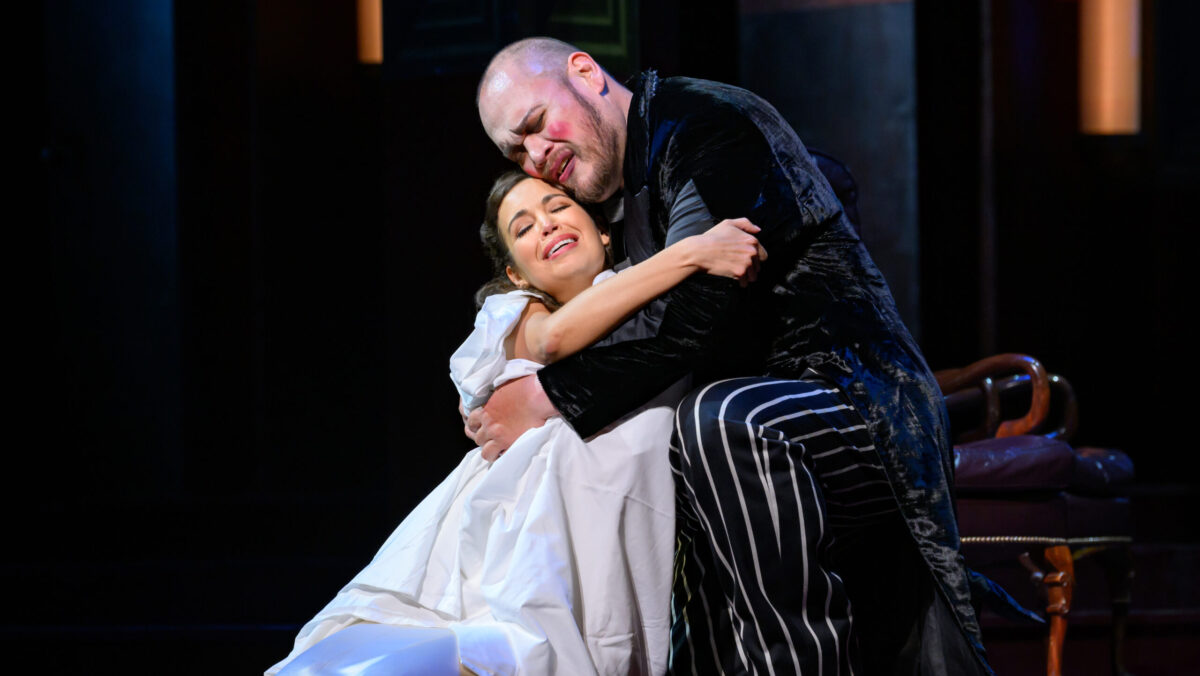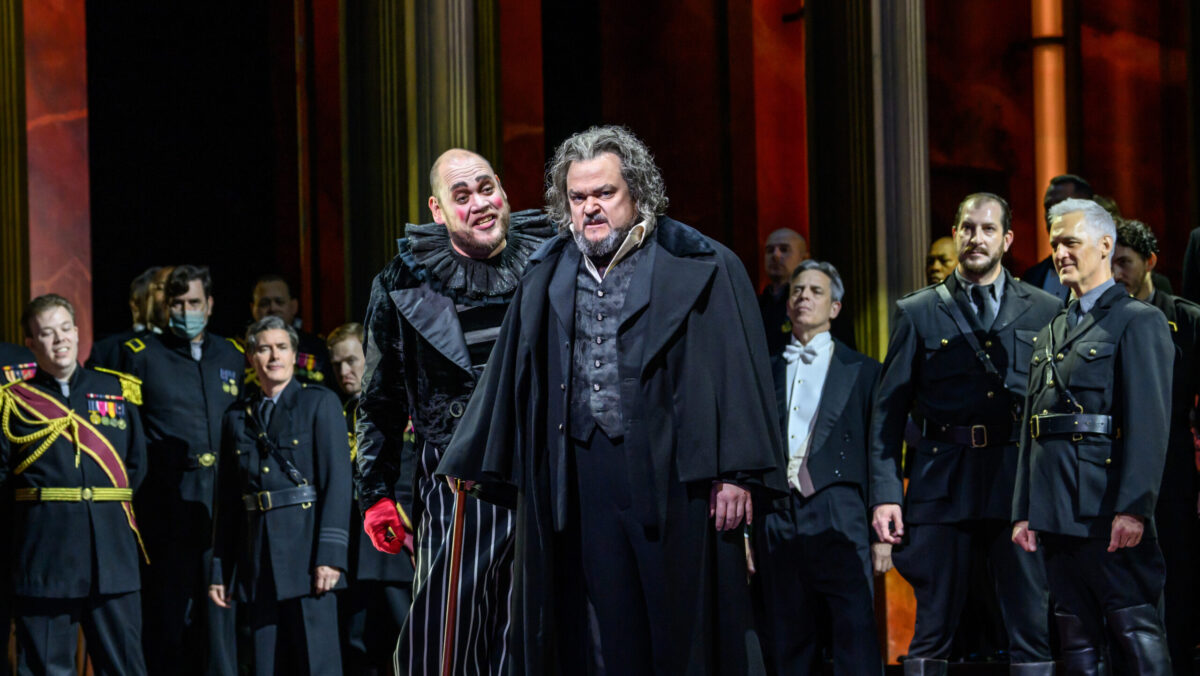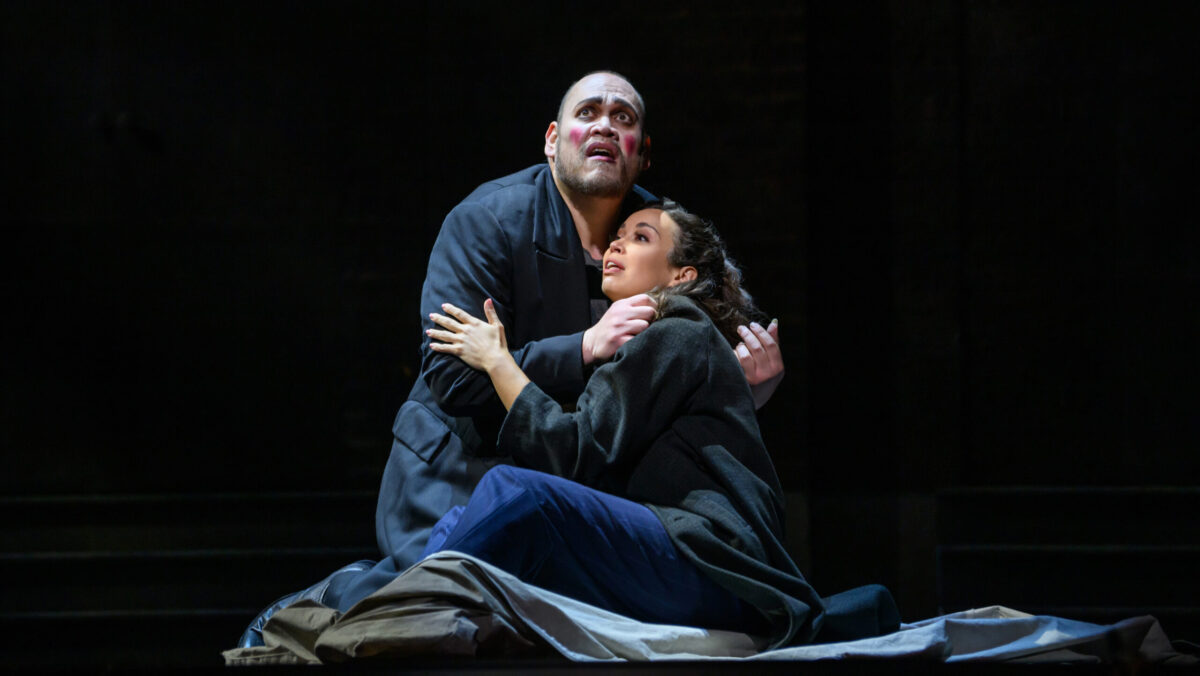

Nina Wurtzel/MetOpera
I’ve observed one thing attention-grabbing in Rigoletto productions lately: The titular hunchback is usually now not a hunchback.
The selection to take away Rigoletto’s humpback does make some sense. Costuming up an able-bodied singer to make him appear to be he has a incapacity isn’t precisely politically appropriate; particularly given the long-maligned popularity of spinal disabilities in fiction. However the jester’s incapacity can also be an necessary a part of the plot and his characterization. How are we meant to know Rigoletto at present, particularly as incapacity rights campaigns grow to be extra mainstream?
In actuality, many courtroom jesters of the opera’s unique setting have been disabled, however they usually had what we now acknowledge as cognitive disabilities. Known as ‘pure fools’, their blunt speech and nonconformity made them entertaining to courts. Maybe the dialog about Rigoletto and incapacity isn’t restricted to bodily look. What if we broaden the scope of what incapacity on this opera may appear to be?
Whereas Verdi seemingly didn’t have cognitive incapacity in thoughts when he and Francesco Piave set about writing Rigoletto, the experiences of the title character really feel distinctly neurodivergent: locked out of a communication community everybody else is tuned into, able to love however browbeaten into cruelty. Simply as there are queer or feminist readings of works not supposed for these functions, I feel that Rigoletto may be analyzed by the lens of autism; not just for what it reveals about incapacity, but in addition for what it might inform us about the best way we watch this opera and the individuals who watch it.
I used to be identified with autism after I was 7. Autistic individuals like me usually have particular pursuits, or devoted passions for sure matters. Opera has all the time been mine. I used to be first proven Rigoletto in elementary music class. I used to be thrilled to see it! Opera was one of many few issues that made sense to me in an in any other case indecipherable world. My classmates lacked my enthusiasm, and plenty of of them interrupted the viewing and made enjoyable of my unusual fascination. It was certainly one of many issues that made me bizarre.


Nina Wurtzel/Metropolitan Opera
Being autistic is so much like being an improv actor in a play. Everybody else has a script to information them, however you didn’t get one and don’t know what’s in it. You determine what you’re presupposed to do by trial and error. A joke another person advised is now not humorous while you inform it; everybody else is in on a plot you don’t perceive. Generally you’re mocked to your face, but it surely’s usually subtler, like individuals dumbing themselves down after they speak to you. Typically they don’t notice you might be autistic– they only know one thing about you appears improper.
Earlier than we meet Rigoletto himself, the opera bearing his identify exhibits us what he’s an outsider from the Duke of Mantua’s courtroom. The courtiers are slick. They might have the compassion of middle-schoolers, however they’re superior communicators. Their Duke is little else than a figurehead. He’s their society condensed into one being. Regardless of being amongst them at their get together, Rigoletto is an outsider. To them, he’s a monster and a joke, and his actions are exterior the “script” all of them share. When Borsa and the Duke cheerfully disregard Depend Ceprano, it’s humorous. When Rigoletto joins in and jests about lopping Ceprano’s head off, he’s cloyingly reprimanded. Even Marullo, the one courtier who acts good to Rigoletto, is the primary to make enjoyable of him behind his again.
It’s additionally attention-grabbing to notice that Rigoletto’s ‘joking’ isn’t playful however quite cuttingly blunt, bearing resemblance to the ‘pure fools’ talked about earlier. He additionally purposely performs up his obnoxiousness. In my expertise, it is a frequent protection mechanism for autistic individuals: if everybody’s going to search out me annoying anyway, I would as effectively do it on objective so it doesn’t harm as a lot.
However Rigoletto isn’t the one outsider within the opera. There’s others: his daughter Gilda and the murderer Sparafucile. These two characters additionally align with autistic experiences. Rigoletto identifies himself in Sparafucile after they meet, they usually genuinely appear occupied with each other’s firm. Their dialog isn’t slick just like the courtiers’ discussions, however there’s mutual understanding there.
Sparafucile’s odd mannerisms- his stilted dialogue, his contradictory-but-strict sense of morality, and his lack of curiosity in socialization- all make sense when contemplating him as autistic. Sparafucile is a mirror to Rigoletto, a fellow outsider in a world not constructed for them. Gilda is Rigoletto’s mirror too; she’s what he may have been. She stays unaware of the world’s cruelty however naively optimistic in the identical approach an autistic youngster is earlier than they’re bullied into disgrace and notice that they’re thought of unchangeably improper.
Talking of Gilda, Rigoletto’s house life along with his daughter exhibits a whole different aspect to him. With the courtiers he could also be obnoxiously brutish however with Gilda he’s poignant and caring. The music is gorgeously illustrative; there may be this deep magnificence there that no one within the courtroom suspects Rigoletto is able to.
https://www.youtube.com/watch?v=3gCRhUh0h0I
The flourishing strings Gilda rushes out onstage to are thematically linked to the carnivalesque music performed when the Duke first mentions her on the prime of the present. However the place the top-of-show music is hole and repeated till the viewers scarcely notices it in any respect, Gilda’s strings are passionate and youthful, shining like sparklers. Gilda and Rigoletto do perceive one another fairly effectively, despite the fact that neither of them actually suppose they do. Each the beginning of the duet and when Rigoletto begins telling Gilda about her mom, characteristic the characters matching one another’s melodies.
However then in each instances, Rigoletto’s concern about his daughter studying in regards to the outer world overtakes him and from that time on, whereas they complement one another within the music, they aren’t matched. I additionally suppose Rigoletto’s actual concern isn’t simply Gilda getting harm, however then her turning out bitter like him- so he reacts and pulls himself away when she begins to repeat him. But at the same time as protected as she is, there are indicators Gilda is already beginning to mimic her previous man. Observe how her response to Rigoletto working himself up over her mom is to ask him to cease speaking, hoping that may make him now not give it some thought in any respect… the very same logic Rigoletto makes use of to discourage her from the outer world.
However he doesn’t solely discover her following his lead, and so he continues to maintain her sheltered. If she’s within the internal world he has created, he thinks, she can be protected and nothing will ever occur to her.
Many autistic individuals have wealthy internal worlds separate from our outer experiences. The autistic thoughts lends itself effectively to wealthy creativeness, deep ardour, and a profound appreciation for magnificence. The depth by which we really feel is a double-edged sword- it makes a lot of the world insufferable, however our pleasure is exponentially larger. And that internal world is commonly incomprehensible to the outer world.
Once I was a child, I couldn’t clarify what drew me to opera — I nonetheless can’t. My friends didn’t perceive and made enjoyable of my passion, whereas my college’s directors discouraged my interests- the logic being if I acquired used to it, I’d shut up and be “much less autistic-acting” after some time. The laborious lesson autistic individuals study is that the internal world have to be hidden, as a result of most individuals is not going to perceive, and those that are hostile to such issues are an excessive amount of of a danger for our security. (And even that we’ve got to cover that we’re autistic at all- this course of known as masking, which I suppose makes the comparability to the masked, blindfolded Rigoletto being tricked into serving to kidnap his personal youngster just a little on-the-nose.)


Nina Wurtzel/Metropolitan Opera
However the tragedy for each Rigoletto and Gilda is that whereas the autistic internal world is gorgeous, no one can exist in isolation without end. They each desperately need to be a part of the world round them. For Gilda, that want results in harmful curiosity and her infatuation with the Duke. And for Rigoletto it results in what we have already got seen- paranoia, malice, self-hatred.
Autistic persons are extra prone to befriend abusive individuals- even ones they hate- as a result of they’re usually so lonely they see them as their solely possibility. Based on the Nationwide Institute of Well being, 90% of autistic individuals expertise interpersonal abuse sooner or later of their lives. Gilda loves the Duke even after he sexually assaults her. Rigoletto is pushed aside by his hatred of the Court docket and simultaneous want for belonging. That is what dooms him; not revenge, not rage. Each characters are struck with the wrestle of being focused by broader society and but needing a society to name house.
The truth is, the opera doesn’t deal with revenge as inherently vulnerable to failure- the courtiers’ revenge plan goes horribly proper, and whereas Depend Monterone’s curse on the Duke doesn’t stick, it does on Rigoletto. Revenge is a behavioral language that every one the courtiers are in on that Rigoletto is excluded from. It’s when Rigoletto makes an attempt to speak in that very same approach that tragedy strikes; his final flaw isn’t that he chooses revenge however that he offers in to the dangerous constructions which have all the time excluded him.
I’m not arguing that autism must be caricatured onstage in the identical approach that Rigoletto’s humpback has been. Nevertheless, I am saying the opera is sensible when it’s learn as a tragedy in regards to the methods society ostracizes autistic individuals, and that this studying can result in additional revelations of the autistic expertise. Rigoletto is among the most nuanced depictions of internalized ableism I’ve seen, and I think about him to be a finer instance of autistic characterization than many characters explicitly written as such.
Typically, autistic characters abide by neurotypical conceptions of what autism appears like, be they savants or “quirky” comedian aid. Not solely does Rigoletto painting one thing apart from these stereotypes, however he’s additionally agonizingly human whereas he does so; his want for belonging may be understood by anybody. Contemplating Rigoletto by the lens of different disabilities can even develop our expectations of who can play the character.
I consider the current Opera North manufacturing directed by Femi Elufowoju Jr. during which Rigoletto, Gilda, and Monterone are Black towards a majority-White solid, permitting the dynamics of ostracization to remain in place with out caricaturing incapacity. What wouldn’t it imply to have an autistic singer play Rigoletto? What may it imply to depict autism onstage within the operatic world? It opens up so many desirable avenues of expression and provides so many potentialities as to the place to take the piece subsequent.
And with the speak of reinterpretation, there may be the everlasting query: What did Verdi imply by all this to start with? When confronted by censors, Verdi threatened to cancel the opera if the jester couldn’t be disabled onstage, writing: “I discover it very wonderful to signify this character outwardly deformed and ridiculous, however inwardly impassioned and full of affection.” Rigoletto is merciless, controlling, and paranoid. He’s additionally a delicate father able to nice kindness. He is just one as a result of he may be the opposite. This actually involves a head in “Cortigiani, vil razza dannata”.
Right here Rigoletto is probably at his most ragingly vicious in your entire opera- but he’s so out of righteousness, doing his damnedest to save lots of his daughter first by pressure after which by determined begging. Each of his points are illuminated and so interlocked it’s unattainable to separate one from another- and the result’s terrifying, miserable, haunting; but in addition jaw-droppingly beautiful. The opera embraces contradictions and in the end argues the titular character is effective as a result of he’s a human being; all his sides are a part of him, and he wouldn’t be Rigoletto have been any aspect of him eliminated.
All disabilities, too, embrace contradictions. Autism does so in a very observable approach. It’s technically an ‘invisible’ incapacity, however research recommend the unconscious is ready to instantly establish and discriminate towards it. Autistic people may be extremely gifted in some areas and deeply behind in others. How autism works genetically is undefined and intangible, and no two instances are the identical. And it’s that unsure contradiction that makes it so terrifying within the thoughts of the general public creativeness, to the purpose it’s grow to be a bogeyman exploited by alt-right and antivax actions.
However by Rigoletto, Verdi argues that that uncertainty must be embraced. The ugly and the chic are each given house in his music. Our contradictions, Verdi exhibits us, make us human. And perhaps if all of us take the time to just accept uncertainty- settle for contradiction, settle for each the present and the deficit, settle for that every one of us are at coronary heart human beings- we are going to really be capable of see one another no matter our neurotype. Perhaps we is not going to solely come to know this opera higher, however ourselves, too.